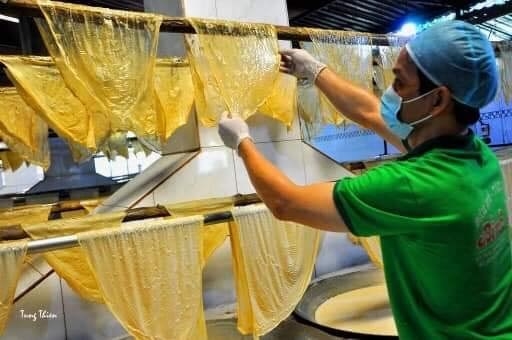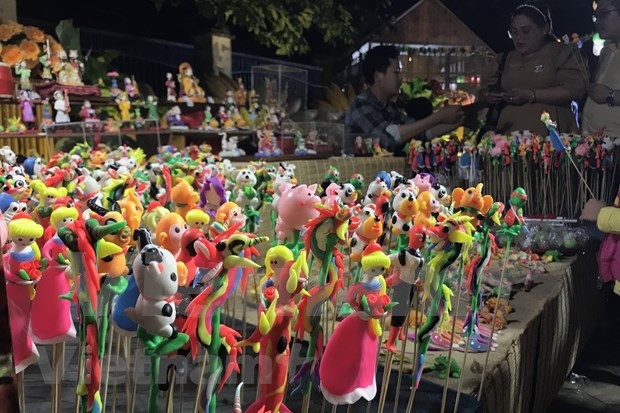 |
| OCOP products on display at a trade fair in Hanoi. (Photo: VNA) |
VOV reported that Deputy chief of the office Nguyen Van Chi said one of the most important goals of the OCOP programme is to boost sales through e-commerce and livestream channels.
The agreement aims to provide the capital with a more comprehensive set of e-commerce solutions for the programme, he said, adding that the city is the first in the country seeking to use TikTok as a new channel for OCOP sales.
 |
| The signing ceremony (Source: hanoimoi.com.vn) |
The two sides will co-organise training courses on making short videos on TikTok to promote OCOP, and how to capitalise all-in-one marketing solutions on TikTok Shop.
Nguyen Thanh Lam from TikTok said the social networking platform will cooperate with Hanoi to build a solid foundation for the OCOP, starting from training in digital skills.
UK a promising market for Vietnamese vegetarian food export
According to VNA, the market for plant-based foods is surging globally after the pandemic, presenting an opportunity for Vietnamese vegetarian food exporters, of which the UK is a promising market.
 |
Producing beancurd skins at Binh Loan vegetarian food factory.
(Photo courtesy of the Binh Loan factory) |
Last week, Dong Thap province-based Binh Loan vegetarian food factory exported two tonnes of canned vegetarian food to the UK with the support of Longdan, the biggest importer of Vietnamese goods in the UK.
This is the first vegetarian food factory in Dong Thap province that has exported canned vegetarian food to a foreign market. Exported products included vegetarian brown rice with lotus seed and six vegetarian beancurd skins with different flavours.
According to Thai Thanh Binh, owner of the Binh Loan food facility, Longdan has approached him and made the export order.
Vegan diet and plant-based foods are gaining popularity among EU and UK consumers, and the UK supermarket chains believes this is a promising market for Vietnamese vegetarian food producers.
Binh said the export procedures to the UK were simple and convenient with the backing of Longdan, especially when the factory’s foods meet the the Sanitary and Phytosanitary measures (SPS).
“Our foods meet the SPS standard of the EU and the UK. We sent the food samples for testing and the results showed they meet the strict requirements of the importing country,” Binh told Viet Nam News.
He said all products are produced without preservatives and the fermentation processes are made traditionally, ensuring food safety and hygiene. This is a rare thing in canned products which are preserved for a long time.
Health concerns after the pandemic are driving consumers globally to change their diet to plant-based food. According to market insiders, this is an opportunity for Vietnamese food processors with sustainable development strategies to enter new markets, especially with the backing of free trade agreements that Vietnam has signed with many countries, including the UK.
The UK-Vietnam Free Trade Agreement (UKVFTA), which officially came into force on May 1, 2021, has created favourable and transparent conditions for the import of agricultural products, food, beverages and other products subject to SPS measures to the UK.
A survey of consumers in seven European countries, conducted by Switzerland-based V-Label GmbH, has found a growing number of respondents are looking to eat more plant-based foods post-COVID-19.
At the height of the pandemic, sales of meat alternatives were reported to rise 265% over a period of eight weeks. Investments in alt-protein also rose sharply to reach 4.8 billion USD in 2021, representing a 102% year-on-year growth.
According to Vu Kim Hanh, chairwoman of the Business Association of High-Quality Vietnamese Goods (BSA), from the perspective of market researchers, the rising trend of vegetarianism is an opportunity for Vietnamese agricultural products but it also requires more businesse bravery, which is to create a trend and create a market.
Data of the vegetarian foods export as an independent sector is not available. Currently, Vietnamese enterprises export vegetarian food and meat alternative food together with other groups of industries, such as fish sauce, soy sauce, instant noodles and vermicelli.
The development of Vietnam's vegetarian and meat alternative food brands to the global market has also not been constructed. However, Hanh said not only for vegetarian food but also for processed food export in general, the strict adherence to the SPS standards are important to export to the fastidious markets like the UK.
Vietnamese economy records remarkable recovery
According to VOV, the nation recorded the highest level of disbursed foreign direct investment (FDI) over the past eight months compared to the same period over the last five years, as well as seeing a growing number of newly-established enterprises and those returning to operation.
 |
| Photo for illustration (Source: VOV) |
According to the General Statistics Office (GSO) under the Ministry of Planning and Investment, most notably, import and export turnover increased, although keeping the growth rate in the context of international economic fluctuations is widely viewed as a new challenge that needs to be identified and requires greater efforts moving forward.
In the eight-month economic statistics table recently released by the GSO, the industrial production index is of interest to many experts as it continues to increase strongly and is back to the pre-pandemic growth rate of roughly 15%.
This figure also indicates the resilience of the manufacturing, industrial and agricultural sectors in helping to ensure a sustainable and stable supply and contributing to efforts to curb the sudden increase of the consumer price index (CPI).
Export turnover in August was estimated to be US$33.38 billion, bringing the overall export turnover over the past eight months to US$250.8 billion, up more than 17% on-year, mainly in the group of processed industrial products.
Furthermore, import turnover of goods in August stood at an estimated US$30.96 billion, raising the import turnover during the reviewed period to roughly US$246.84 billion, up 13.6% on-year, primarily in the group of production materials.
The trade surplus in August reached US$2.42 billion, while that of the eight-month period was estimated to be at US$3.96 billion.
Dr. Le Duy Binh, director of the Economica Vietnam Center for Economic Research, said that this trade surplus greatly supports the implementation of monetary policies, especially amid the difficult pressures faced by the country in recent times.
"In general, the growth rate took place amid the CPI soaring by only about 2.5% and core inflation by about 1.6%, which is a bright spot in the current economic situation when many major economies in the world and many other economies in the region are facing plenty of difficulties, struggling with high consumer price index and high inflation. This is a positive point for the Vietnamese economy in the current context,” Binh went on to say.
One of the other notable indicators is the business registration situation is the whole country having nearly 150,000 enterprises registered as new establishments or returning to operation, an increase of more than 30% compared to the same period last year. On average, every month, 18,700 enterprises are newly established and resume their operations.
However, the number of enterprises withdrawing from the market was 104,300 enterprises, representing an increase of 22%. On average, 13,000 businesses withdraw from the market every month.
Experts believe that, in addition to the positive growth rate in general, it can be viewed as necessary to clearly analyse and take a deep look at this issue. The fact is that many firms were forced to withdraw from the market because they failed to meet the requirements of the economy or were unable to endure the difficulties experienced since the pandemic. This indicates that the recovery pace of growth is not sustainable, especially in the new context.
According to details given by experts, inflation pressure from now until the end of the year remains very large. The lag of inflation will therefore focus on the remaining quarter of the year and the whole following year. The management of fiscal and monetary policies will require special attention in terms of the management of petrol and oil prices as it continues to be an issue.
Moreover, experts note that all changes in the labour market or changes in consumer behaviour must be monitored to ensure that growth remains high without affecting the major balances of the national economy.
When the macro economy is stable in the final months of the year, it will be a premise for strong and sustainable growth enjoyed by the whole economy in 2023.
All of this therefore requires more flexible policies alongside continuing reforms even in the midst of economic recovery, while each economic sector, each citizen, and each enterprise should step up greater efforts in this process, experts emphasized.
Hanoi to host festival of craft villages, streets next month
Hanoi will host a festival of craft villages and streets at the Imperial Citadel of Thang Long from October 13 – 16, aiming to promote and preserve local traditional handicrafts, VNA cited the sayings of Vice Chairman of the municipal People’s Committee Nguyen Manh Quyen.
 |
| "To he" (coloured rice dough toy) making is a traditional handicraft of Xuan La Village in Ha Noi's Phu Xuyen District. (Photo: VNA) |
The festival will be held annually to develop craft village-based tourism and promote cultural spaces of craft villages and streets in the capital city, Quyen said.
The event will also be a chance for traditional craftsmen and craft villages not only from Hanoi but also across the country to introduce their products and seek partnership and export opportunities.
It will feature around 200 booths showcasing handicrafts, divided into six zones, including one for the recreation of Hanoi’s Old Quarter in the old times, with traditional silk stores in Hang Gai Street and “Ao Dai” (Vietnamese long gown) tailor shops in Luong Van Can Street. There will be demonstration of traditional jewellery making in Hang Bac Street.
Separate zones will be set up for craft villages in Hanoi and other cities and provinces. That for Hanoi craft villages will represent various folk crafts, including pottery-making in Bat Trang, Van Phuc and Son Dong, lacquer painting in Ha Thai, buffalo horn comb making in Thuy Ung, "to he" (coloured rice dough toy) making in Xuan La and rattan and bamboo handicraft in Phu Vinh.
There will be zones for folk games and tradition cuisine of Hanoi./.